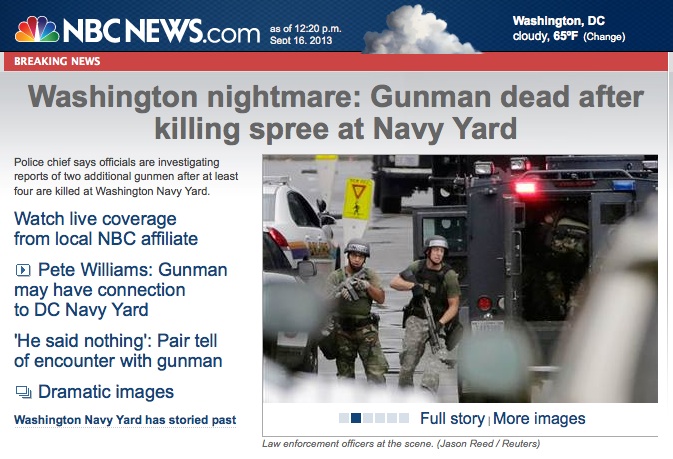With multiple people dead, including at least one shooter, the scene at the Washington Naval Yard remains chaotic.? In terms of the most important questions, what we don’t know, far outstrips what we do.? How many victims in total?? How many attackers?? What prompted the attack?? Is it part of some larger plan of attacks?? We don’t know the answers to these questions but I bet that we all have immediate responses to the attack anyway, and that being aware of them is a pretty powerful diagnostic of the national sense of anxiety over terror.
Ask yourself the following:? what were your first thoughts when you heard the news.? Did you have an immediate suspicion of who did this or why?? What questions were most important to you to have answered, and why those questions?? Did you have any sense that you were somehow more in danger, even if these events were transpiring far away?? Were you more curious about the victims or the perpetrator(s)?? Why do you think that might be?? Was there an impulse to check on those you love, even if they have nothing to do with events in the capitol?? If so, what is that about?
Our responses to attacks like one in DC can tell us a great deal about who we are and what really animates us.? Without judging any of the responses, as a nation suffers mass attacks in public settings, at a seemingly increasing rate, it pays to know what we bring to the challenge of keeping us safer.? That is an important distinction between a wise response and those that are less so.

Listed for many years in Newsweek as one of America’s “50 Most Influential Rabbis” and recognized as one of our nation’s leading “Preachers and Teachers,” by Beliefnet.com, Rabbi Brad Hirschfield serves as the President of Clal–The National Jewish Center for Learning and Leadership, a training institute, think tank, and resource center nurturing religious and intellectual pluralism within the Jewish community, and the wider world, preparing people to meet the biggest challenges we face in our increasingly polarized world.
An ordained Orthodox rabbi who studied for his PhD and taught at The Jewish Theological Seminary, he has also taught the University of Pennsylvania, where he directs an ongoing seminar, and American Jewish University. Rabbi Brad regularly teaches and consults for the US Army and United States Department of Defense, religious organizations — Jewish and Christian — including United Seminary (Methodist), Yeshivat Chovevei Torah (Modern Orthodox) Luther Seminary (Lutheran), and The Jewish Theological Seminary (Conservative) — civic organizations including No Labels, Odyssey Impact, and The Aspen Institute, numerous Jewish Federations, and a variety of communal and family foundations.
Hirschfield is the author and editor of numerous books, including You Don’t Have To Be Wrong For Me To Be Right: Finding Faith Without Fanaticism, writes a column for Religion News Service, and appears regularly on TV and radio in outlets ranging from The Washington Post to Fox News Channel. He is also the founder of the Stand and See Fellowship, which brings hundreds of Christian religious leaders to Israel, preparing them to address the increasing polarization around Middle East issues — and really all currently polarizing issues at home and abroad — with six words, “It’s more complicated than we know.”

